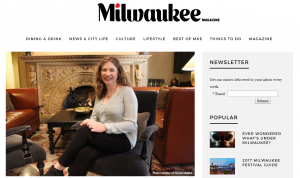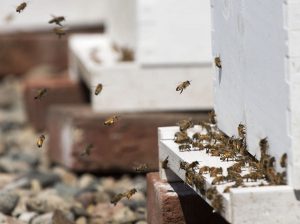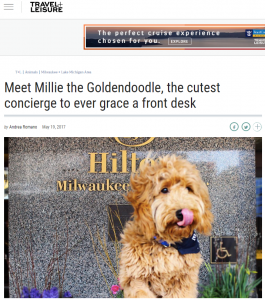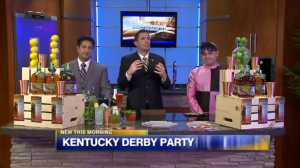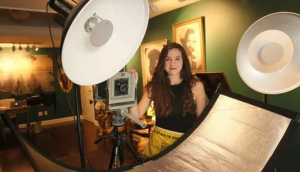Marcus Hotels Press > Press Coverage
06.16.17 |
Milwaukee Magazine Features the Pfister’s Narrator-in-ResidenceThe official hotel narrator is tasked with bringing the hotel’s stories to life in a year-long commitment. As the mother of two sets of twins, writer Nicole Mattke is no stranger to dichotomies. She employs this convention in her introductory post on the Pfister Hotel’s blog, showing the reader a “before” snapshot (her childhood writerly aspirations) and an “after,” as she types her own tale from behind the storied narrator desk in the Pfister’s lobby. Mattke’s denouement (or perhaps her inciting incident, depending on how you read this particular story): her official appointment as the Pfister Hotel’s 2017-2018 Narrator in Residence. Mattke refers to the year-long commitment as her “dream job.” “I’ve always wanted this job since I’ve known about it,” she said, citing her love for the historic hotel and the freedom and flexibility the job affords. “You kind of put your fingerprint on the Pfister for the year that you’re here, and then the next narrator can come in and do something totally different.” The Narrator-in-Residence program, a complement to the Artist-in-Residence program, is now in its tenth year. Mattke succeeds the ninth Narrator in Residence, Dominic Inouye, whose term ended on April 30. Narrators commit to spending a minimum of ten hours per week wandering the public areas of the hotel, bringing its stories to life in twice-weekly blog posts in exchange for a $1,000 monthly stipend. Along with the financial support and prestigious designation comes the responsibility to bring to the surface the stories each guest carries with them as they move in and out of the hotel. “Basically my job is just to reveal what’s already happening here,” Mattke said. Or as she so eloquently phrased it in her introductory post, “I’m here to capture the Pfister and all of us who live, however briefly, inside these ornate walls, themselves thrumming with history.” Mattke, who earned a degree in writing, had thus far dedicated her career to non-profit leadership, writing poetry and creative non-fiction in her free time. “I think I’m a poet at heart,” she said. “Even when I’m not writing, poetry—specifically poetic language—is the freest way I can describe the world. [I enjoy] taking a non-fiction story and writing it in a way that shows the beauty and the poetry that’s just around us all the time.” Creative nonfiction, Mattke’s genre of choice, is what might lie at the center of a poetry-fiction-nonfiction Venn diagram. The stories each Narrator uncovers at the Pfister—all factually accurate and told in the blog’s signature literary, essayistic style—fit right into Mattke’s wheelhouse. One of her goals, beyond merely populating the Pfister blog with a steady stream of content, is to reinforce the idea that everyone’s life is interesting. As an erstwhile stay-at-home mom, Mattke recalls the tendency for moms to discount their own lives as “one-note.” She said moms on the proverbial playground often seem more comfortable sharing their children’s stories, even defaulting to introducing themselves as “Aiden’s mom,” for example, in lieu of a name. “Everybody has much better stories underneath that they don’t even know are their stories, necessarily,” Mattke said. “They’re excited about some part of that life, they chose it for some reason, they love somebody in that life, they are good at something in that life.” Mattke blames social media, to some degree, for degrading the public’s understanding of storytelling and appreciation for good writing. In fact, she shies away from the word “blog” when approaching hotel guests because of its connotations of transience and disposability. Mattke riffs on this very culture in her recent post, What to Do When Your Kids Grow Up and Move Out, according to Jeff and Lisa, a ten-part listicle that’s more Modern Love than Buzzfeed. Another of Mattke’s overarching goals for the year is to orchestrate the public’s perception of the Pfister as a place of literary prominence. Besides capturing hotel guests’ stories for the blog, Mattke will moderate a book club in partnership with Boswell Book Company (their first book, A Gentleman in Moscow takes place at a hotel), host seasonal mini-events around famous works of literature (think Winnie the Pooh and Sherlock Holmes) and post monthly story prompts at the official narrator desk. “If my bookish and writer friends in Milwaukee think of this as a place to go for bookish things, that would be an accomplishment,” Mattke said. “I just want to get people excited about words again.” Mattke’s tenure as Narrator in Residence has just begun, but she’s already looking to the future: she says she has aspirations of publishing a book someday and is hopeful that the accountability and routine she cultivates at the Pfister will spark future writing projects. In the meantime, she implores the Milwaukee community to stop by or get in touch. “A lot of people don’t know about the narrator position and might not know that I’m around,” Mattke said. “So if anybody is at the Pfister and wants to tell a story, I am more than happy to hear it and write about it.” Article ( https://www.milwaukeemag.com/meet-nicole-mattke-2017-narrator-in-residence-pfister-hotel/ ) |
06.14.17 |
Milwaukee Magazine: Meet Nicole Mattke, the New Narrator-in-Residence at the Pfister HotelMilwaukee Magazine featured Nicole Mattke, the newest Narrator-in-Residence at the Pfister Hotel. Read more about Nicole in her new role and find out her plans during her year-long residency. |
06.13.17 |
Premier Bride: Planning the Perfect Wedding Color PalettePremier Bride featured tips from Marcus Hotels & Resorts’ wedding experts on how to choose the perfect color palette for your wedding. Read the article to see where you should visit for color inspiration. |
06.09.17 |
National Trust for Historic Preservation: 9 Dream Wedding Locations Inside Historic HotelsThe National Trust of Historic Preservation mentioned the Pfister Hotel and the Hilton Milwaukee City Center in its piece on dream wedding locations inside historic hotels. Read how these hotels can be the perfect backdrop for your dream wedding. |
06.02.17 |
Lincoln Journal Star: On top of the Cornhusker, a hotel honey farmThe Lincoln Marriott Cornhusker’s newest long-term guests, 40,000 honey bees, were featured in the Lincoln Journal Star. Read about why the hotel chose these long-term guests and how the bees will be used throughout the hotel. |
05.19.17 |
Travel + Leisure: Meet Millie the Goldendoodle, the cutest concierge to ever grace a front deskTravel + Leisure featured Millie, the Hilton Milwaukee City Center’s famous canine concierge. Read how this 8-month old pup loves to lounge on the concierge desk, chase her ball down the hallways and help deliver guests’ luggage. Especially if it means she gets to ride on the luggage cart. |
05.08.17 |
Weight WatchersWeight Watchers Body Pride Tee Time Take up a lifetime sport: golf. Why? You could burn some calories, help strengthen your core, and thats just the beginning. By: Lindsey Emery
|
05.04.17 |
WITI-TV: From Mint Juleps to fancy hats: How you can celebrate the Kentucky Derby in MilwaukeeZulf Shariff, general manager of Monarch Lounge at the Hilton Milwaukee City Center shared the exciting event happening at the hotel this weekend for the Kentucky Derby. Watch here to learn about the photo opportunities with horses and Millie, the hotel concierge, along with the Kentucky Derby-inspired drink specials. |
04.20.17 |
Milwaukee Journal Sentinel Features The Pfister’s Artist-in-ResidencePfister artist Margaret Muza processes love of history through tintype photographsTaylor Davis, a valet and bellman at the Pfister Hotel, sits down in front of the camera, and Margaret Muza goes to work. Wearing goggles, gloves and a mask, Muza mixes a liquid film called collodion in a nearby walk-in closet that she’s converted to a darkroom. She carefully pours just enough collodion to coat a metal plate — aluminum with a black coating. She drips off the excess and then puts the plate into a bath of silver nitrate. When her sand timer runs out, Muza loads the plate to transport it from her darkroom to the camera. She lines up the shot and clicks the shutter. Muza must develop the photograph in the next 15 minutes before the chemicals on the metal plate dry. Muza, the artist in residence at Milwaukee’s Pfister Hotel, practices a style of photography popular during the American Civil War, capturing images onto sheets of metal. It’s called tintype photography, characterized by its use of metal to create a direct positive. The style — also known as melainotype or ferrotype — became popular in the mid-1850s. It was more durable and cheaper than daguerreotypes or ambrotype photographs at the time. The tintype method went out of common use at the beginning of the 20th century. Back in her darkroom under safe red lights, Muza pours developer onto the metal. Slowly, a negative of the image appears. Once she sees what she’s looking for, she pours on water to stop the development and rinses the chemicals off. Then she pours fixer onto the plate to turn the negative image into a positive one. Tintypes can last for more than 100 years if they’re preserved. To protect her photographs, Muza pours a varnish made from alcohol, lavender oil and tree sap onto the plate. The tintype is complete. The portrait of Davis in his uniform could have been displayed on opening day at the Pfister in 1893 — and it would have looked charmingly old then. |
04.18.17 |
Milwaukee Journal Sentinel: Pfister artist Margaret Muza processes love of history through tintype photographsThe Milwaukee Journal Sentinel featured the Pfister’s 2017-2018 artist-in-residence, Margaret Muza and her unique art form, tintype photography. Learn about this historic photography process that dates back to the 1860’s and watch the video on how Muza creates a work of art using sheets of metal and chemistry here. |


